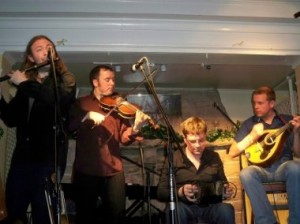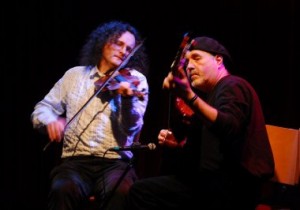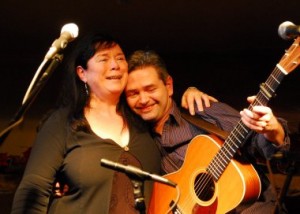“In 1976 I got a phone call from Paddy Moloney. I was working in a print shop, doing layout design and lithographic plates. The phone rang in the darkroom and he asked me if I’d consider doing bodhrán on a couple of tracks.”
So began Kevin Conneff’s long career recording and touring with the Chieftains. Conneff took a week off from the job, traveled from Dublin to London, laid down those “couple of tracks” on what would become the Chieftains’ sixth album, “Bonaparte’s Retreat.” And he figured, well, that’s that.
But Moloney had other plans. Conneff didn’t know it, but Peadar Mercier, the Chieftains’ second bodhrán player, was retiring. “Toward the end of the week, he (Moloney) asked me if I’d consider making it full time,” said Conneff in a call from Birmingham, Ala., halfway through the Chieftains’ latest tour—a tour that will bring them back to Philadelphia’s Kimmel Center Sunday, March 15, for a show in Verizon Hall at 3 p.m.
Conneff, secure and happy in his print shop job, had to think about it. “I remember thinking I’d do it a couple of years and I’d go back to the print shop, maybe start up my own” Conneff said with a laugh.
With each new Chieftains success—and there were many—it seemed less and less likely that Kevin Conneff would ever again lay hands on a lithographic plate. What followed instead was a remarkable career as the Chieftains’ singer and drummer.
For most of the Chieftains, some kind of lifelong involvement with traditional music was preordained. Not so for Conneff, who first became enamored of it when he was in his teens.
“I’m not really like Sean (Keane) and Matt (Molloy) and Paddy,” Conneff said. “They heard the music from the womb. My parents had a mild interest in Irish music and dance, but I just barely happened on it. Some of the lads I was working with were into Irish music.”
Conneff, a Dublin kid whose musical interests up to that point ran more to jazz and popular music, suddenly found himself criss-crossing the countryside in search of fleadhs and sessions on weekends.
“The first place I really encountered the music was in Mullingar in the midlands of Ireland when I heard these people playing, farmers really. I was absolutely knocked out,” he said. “I remember thinking; these guys are as good as the (jazz) musicians like Charlie Parker I’d been listening to on records.”
Getting to work on Monday morning in anything like decent shape was sometimes a challenge. “I went back the job very often still smelling of hay barn and Guinness,” he said.
As much as Conneff appreciated the instrumentalists, it was the singers who stole his heart. He started picking up the words to the old ballads and gradually, tentatively tried them out in sessions.
“I was always interested in singing,” he said. “I used to sing pop songs and whatever. I was into Ella Fitzgerald singing ‘How High the Moon,’ which bowled me over … and still does. The very fact that it (singing traditional songs) was just an interest, a hobby made it easy. I was just doing it for my own sake and to be a part of these sessions and not be peripheral to it.”
“If it became known that you sang a couple of ballads you had to sing them really well to be accepted in a session. It was quite a thing when one of the older players would say, ‘Let’s have a song.’”
Much later, Conneff learned to play the bodhrán, the traditional goatskin frame drum. And he also learned to practice restraint, to patiently wait to be invited to play.
“if you’ve respect for the musicians and the music, you hold your fire,” he said. “In those days, particularly a lot of the older players would frown at a bodhrán coming into a session. The last thing they wanted was some obnoxious, thundering, banging bodhrán to cover up all their talent. You just have to learn to be humble.
“Unfortunately, the bodhrán attracts a type that comes in, and very often they’re flamboyant in their dress or have bits of fur hanging off the drum and they just hammer away. They just have no sensitivity to the music.”
Conneff’s respect for the music led to his involvement in a pioneering venture called the Tradition Club, a gathering place for local Irish musicians at Slattery’s at 129 Capel Street in Dublin. It was while helping to run that club that Conneff rubbed shoulders with Moloney and other local stars of the traditional scene.
Conneff and the other organizers saw the Tradition Club as an alternative to the guitar-and-ballad style that was popular in folk music in the late ‘60s. The club was also a warm and welcoming venue for many of the country musicians—the ones who so impressed Conneff in his earlier days—who would be brought in to share their gifts.
“The guitar and ballad thing was more prominent in Dublin than the real thing, so to speak,” said Conneff, “so myself and some friends started the Tradition Club where the emphasis was on the traditional player and singer. We’d bring in people from rural areas to play for a night. That was a great education for those of us running the club. We hosted people like Willie Clancy and Seamus Ennis—the greats of the Irish music scene in those days.”
Conneff was still helping run the Tradition Club when he joined the Chieftains. The club continued on for a number of years.
Some would say the Chieftains have taken a few detours away from the tradition over the years. Probably a different way of looking at it is that they’ve helped to popularize the music by showing what it has in common with other forms of music. For example, the Chieftains are currently at work on a recording drawing on the story of the San Patricios Battalion, a group of largely Irish ex-pats who fought against the United States on the side of Mexico. “A lot of them were executed on the outskirts of Mexico City,” said Conneff. “To this day there is a pipe band called the San Patricios. Every Sunday they march out to this memorial at a convent where the soldiers were executed. Paddy has been working with this connection. He’s put together some wonderful music with a Mexican Irish theme. We’ll be doing some of that in the concert. We’re doing an album of the music. It should be completed by September.”
Conneff has also been pursuing a non-Chieftains project with three other phenomenal musicians. Fittingly, it’s called The Tradition Club. Along with Conneff, the band features Gerry O Connor of Dundalk on fiddle, Dubliner Paul McGrattan on flute and the Breton Giles Le Bigot on guitar.
With luck, you’ll get a chance to hear the results of the quartet’s handiwork. “We put down a few tracks and will try to put together an album toward the end of this year,” said Conneff. With one member of the band on the Continent, recording and playing concerts can be challenging, Conneff said. “The logistics of it are a bit difficult. Any time we do gigs he (Le Bigot) has to come over to Ireland. Very often the fees go to pay his expenses. It’s very enjoyable to be doing something like that.”
While you’re waiting for that musical experiment, you’ll just have to content yourself with Conneff’s other band, which arrives in Philadelphia for a concert (unfortunately) the same day as the Philadelphia St. Patrick’s Day parade. The Chieftains’ annual visit to Verizon Hall usually coincides with that event. After so many concerts and so many years on the road, many venues tend to blur together. Not so, Verizon Hall. For the Chieftains, it’s one of the best places to play.
“That’s a fantastic venue,” Conneff said. “Any time we’ve played there, it’s been an afternoon show. A lot of the times, we’ve had to detour going to the theatre because of the parade. Sometimes the older venues are the best from an acoustic point of view. But of the newer venues the Kimmel Center sound is wonderful.”



